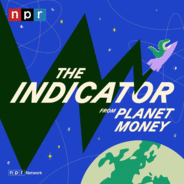There has been an inordinate amount of trading activity recently in the crypto markets. But what if much of that activity was an illusion? A smokescreen? A fraud? Today on the show, we look at the practice of wash trading, and how it’s evolved in the crypto world. Related episodes: The fake market in crypto For sponsor-free episodes of The Indicator from Planet Money, subscribe to Planet Money+ via Apple Podcasts or at plus.npr.org. Fact-checking by Sierra Juarez. Music by Drop Electric. Find us: TikTok, Instagram, Facebook, Newsletter. Learn more about sponsor message choices: podcastchoices.com/adchoicesNPR Privacy Policy

Wirtschaft
The Indicator from Planet Money Folgen
A bite-sized show about big ideas. From the people who make Planet Money, The Indicator helps you make sense of what's happening in today's economy. It's a quick hit of insight into money, work, and business. Monday through Friday, in 10 minutes or less.
Folgen von The Indicator from Planet Money
300 Folgen
-
Folge vom 17.09.2025The crypto market is hot. But is it an illusion?
-
Folge vom 16.09.2025Why an aggressive rate cut could backfire on TrumpThe Federal Reserve is expected to make a modest cut to interest rates this week of about a quarter or half a percentage point. President Trump, however, believes they should take a far more aggressive approach: a 3-percentage point cut. Today on the show, we examine what a 3-percentage point cut would actually look like, and why that outcome would likely backfire on the president. Related episodes: It's hard out there for a Fed chair Should presidents have more of a say in interest rates? Can the Federal Reserve stay independent? For sponsor-free episodes of The Indicator from Planet Money, subscribe to Planet Money+ via Apple Podcasts or at plus.npr.org. Fact-checking by Sierra Juarez. Music by Drop Electric. Find us: TikTok, Instagram, Facebook, Newsletter. Learn more about sponsor message choices: podcastchoices.com/adchoicesNPR Privacy Policy
-
Folge vom 15.09.2025Why beef prices are so highBeef is getting more expensive, and it doesn’t look as though that’s going to change any time soon. That’s the view of the Federal Reserve Bank of Dallas, which wrote in its Beige Book entry this month that the trend of rising beef prices continues. There’s solid demand for beef, but falling supply, as production decreases. Ranchers are making more per cow, but their costs are rising. We speak with a rancher in Wyoming to learn what high beef prices mean for him and other ranchers. Related episodes: What happened to US farmers during the last trade war How USAID cuts hurt American farmers For sponsor-free episodes of The Indicator from Planet Money, subscribe to Planet Money+ via Apple Podcasts or at plus.npr.org. Fact-checking by Sierra Juarez. Music by Drop Electric. Find us: TikTok, Instagram, Facebook, Newsletter. Learn more about sponsor message choices: podcastchoices.com/adchoicesNPR Privacy Policy
-
Folge vom 12.09.2025ICE raids, cooling on capitalism, and a Murdoch settlementIt’s … Indicators of the Week! Our weekly look at some of the most fascinating economic numbers from the news. On today’s episode: the concept of capitalism is cooling in American minds; the U.S. policies behind the Hyundai ICE raid; and an influential family’s succession saga comes to a thrilling (and expensive!) conclusion. Related episodes: Salvaging democratic capitalism, with Martin WolfHow to pass on a global media empireFor sponsor-free episodes of The Indicator from Planet Money, subscribe to Planet Money+ via Apple Podcasts or at plus.npr.org. Fact-checking by Sierra Juarez. Music by Drop Electric. Find us: TikTok, Instagram, Facebook, Newsletter. Learn more about sponsor message choices: podcastchoices.com/adchoicesNPR Privacy Policy
